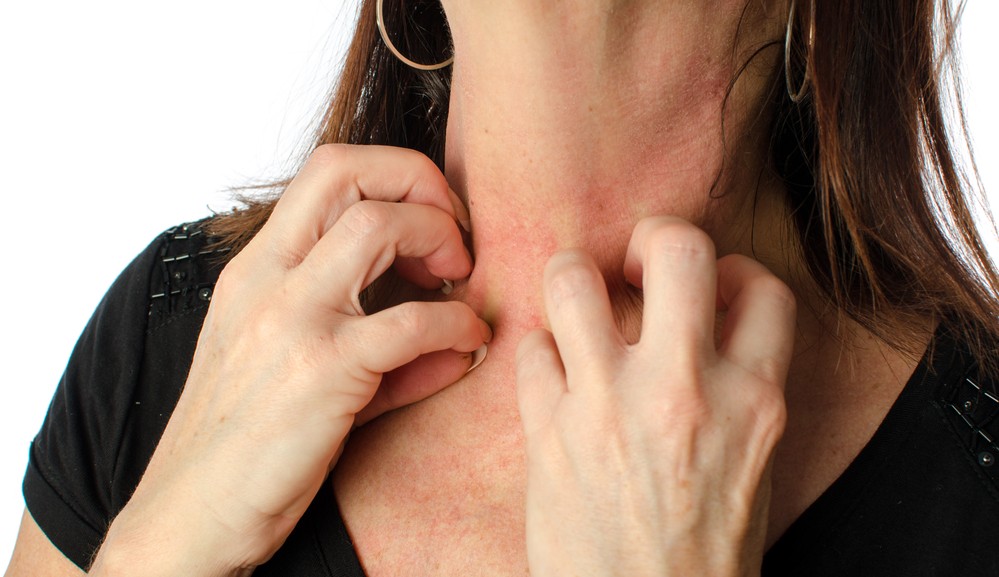As a BetterHelp affiliate, we receive compensation from BetterHelp if you purchase products or services through the links provided
Stress is a psychological and physical response to a demanding situation. It’s your body’s way of preparing you to fight or flee. When you perceive a threat, your nervous system kicks into gear, releasing hormones that boost your heart rate and raise your blood pressure. This “fight-or-flight” response is a normal reaction meant to protect you.
But sometimes, your body produces too much of the stress hormone cortisol. This can weaken your immune system, making you more susceptible to infections and illness. It can also cause skin problems like hives and psoriasis.
What Is a Stress Rash, and What Are the Symptoms?
A stress rash is a type of skin irritation that several different things can cause, including exposure to certain chemicals, allergies, or even stress.
The most common stress rash symptom is an itchy skin patch with raised red bumps, but other symptoms can include swelling, blistering, and even crusted-over lesions. They are often accompanied by a burning or tingling sensation that can become quite painful.
Stress rashes can occur anywhere on the body, but they are most commonly found on the face, neck, chest, or arms. If you think you may have a stress rash, you must see a doctor or dermatologist for proper diagnosis and treatment. Left untreated, they can lead to secondary infections or other skin problems.
It can be challenging to identify the difference between types of skin rash, for example, a heat rash, an allergic reaction, and a stress-induced rash. It’s not recommended to diagnose your stress rash yourself. An excellent way to start is by visiting your doctor, who can better assess your condition and rule out any other potential causes.

What Are the Causes of Stress Rashes?
There are many possible causes of stress rash, including allergies, infections, and certain medical conditions. However, the most common cause is psychological or emotional stress. When we are under a lot of stress, our bodies release a hormone called cortisol. This hormone can interfere with the body’s immune system, making us more susceptible to skin conditions like rashes.
There are several things you can do to prevent these rashes from happening. First, try to reduce the amount of stress in your life. If you are already experiencing a lot of stress, try relaxation techniques such as yoga or meditation.
Therapy is available for people who are struggling to manage their stress levels. Unmanaged stress can lead to chronic stress, which can have several adverse health effects, so it is essential to get help if you are struggling to cope.
In addition to managing your stress levels, you can also take steps to protect your skin from irritants. If you know you are allergic to certain substances, avoid them as much as possible. Be sure to wash your skin regularly, and avoid scratching or rubbing your skin.
In addition, it is crucial to practice good skin care habits. This means keeping your skin clean and moisturized and avoiding harsh soaps or chemicals.
You should also avoid triggers that worsen your skin rashes, such as excessive heat or sweating. See your doctor for more evaluation and treatment options if you have a stress rash that does not go away with home treatment. A severe allergic reaction may require emergency medical treatment.
How Do You Treat a Stress Rash?
If you already have a stress rash, there are a few things you can do to help relieve the symptoms. Try applying a cool compress to the area for 10-15 minutes several times a day. You can also try over-the-counter hydrocortisone cream or calamine lotion to help relieve itchiness.
If the rash does not improve after a few days of self-care, make an appointment with your doctor. They may prescribe a more vital medication, such as an oral antihistamine or steroid cream.
With proper treatment, most stress rashes will resolve within two weeks.
Can Stress Rashes Lead to Other Health Problems?
While most stress rashes are harmless and will go away on their own, some people may experience more severe reactions that can lead to other health problems.
If you have a stress rash accompanied by difficulty breathing, swelling of the face or throat, or dizziness, you should seek medical attention immediately. Less severe reactions can be treated at home with over-the-counter products such as antihistamines and hydrocortisone cream.
If you find that your stress rash is bothersome or interferes with your daily life, you may consult a doctor to see if other treatment options are available.
How Can You Reduce Your Risk of Developing a Stress Rash?
One of the best ways to prevent stress rashes is to manage stress levels. Chronic stress can weaken the immune system and make the body more susceptible to skin problems. Therefore, it is essential to find healthy ways to reduce stress, such as exercise, meditation, or journaling.
In addition, it is essential to practice good hygiene and avoid using harsh soaps or detergents that can irritate the skin. Wearing loose-fitting clothing made of natural fibers can also help to prevent stress rashes by allowing the skin to breathe.
When to See a Doctor
If you have a rash that is causing you concern, it is always best to consult with a medical professional. They will be able to take a look at your rash and determine whether or not it is something that needs to be further investigated.
In most cases, the doctor will ask about your medical history and any medications you are currently taking. They will also likely perform a physical examination of the rash. Depending on the results of these initial tests, the doctor may order additional tests, such as a skin biopsy or blood work.
Once the cause of the rash has been determined, the doctor will prescribe the appropriate treatment. In some cases, the rash may resolve on its own with no treatment necessary. However, if an infection or other serious condition causes the inflammation, it is essential to follow the doctor’s recommendations to ensure that the condition does not worsen.
Conclusion: What is a Stress Rash, and What Can You Do About It?
If you have a rash and are feeling stressed, it’s essential to seek medical advice. Many things, including an allergic reaction, infection, or underlying skin condition, can cause a stress rash.
Knowing how to identify the symptoms and causes of a stress rash can help you prevent them from happening in the first place. And if you already have a stress rash, some treatments can help clear it up quickly. While most rashes will go away on their own with at-home care, some may require prescription medication or light therapy.
In rare cases, a stress rash can lead to other health problems, so you must see a doctor if you’re concerned about your skin.
FAQs
This site contains affiliate links to products. We will receive a commission for purchases made through these links.



